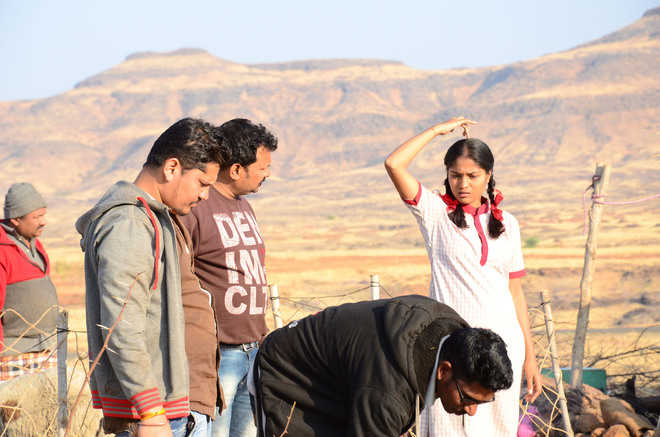
A still from Palshichi PT
Saibal Chatterjee
Marathi cinema has, of late, been making its presence felt at major international festivals, notably the ones in Berlin and Venice, but Cannes continues to remain out of bounds for filmmakers from the western state. To redress this anomaly, the Maharashtra Government has been investing Rs 30 lakh annually for the purpose of sending three Marathi films to the world’s premier film festival.
Initiated in 2016 at the behest of Maharashtra’s Minister for Cultural Affairs Vinod Tawde, the project is now in its third year. Three new Marathi films — Dhondiba Karande’s Palshichi PT (PT Usha of Palshi), Deepak Gawade’s Idak (The Goat) and Manouj Kadaamh’s Kshitij (Horizon) — will be seeking global attention at the 71st edition of the Cannes Film Festival (May 8 to 19). All three are films by first-time directors.
“The initiative has been yielding the desired results,” says veteran Mumbai-based film critic and documentary maker Ashok Rane, who brings many decades of exposure to international film festivals to bear upon his role as the coordinator of the project. Like he did in 2016 and 2017, he will travel this year as part of a 10-member Marathi cinema delegation to the French Riviera. The team will include the director and the producer of each of the three films.
Palshichi PT, Idak and Kshitij, which will have two industry screenings each in Cannes, are all set in rural Maharashtra. The first film tells the story of a shepherd community girl whose athletic skills receive support from the least likely of quarters but she runs into societal obstacles erected by her immediate family and the school system that she is a part of.
Idak revolves around a 32-year-old man, who is still a child at heart. The film follows him as he sets out for a temple town with a sacrificial goat. As his mother waits there for his arrival, the protagonist develops a bond with the animal: a metaphor for the solidarity of the downtrodden.
In Kshitij, a village girl wants to continue her school education but her father, a struggling farmer, has other plans. While focusing on the girl child’s need to get ahead in life, the film widens its scope to also take in the severe agrarian crisis facing parts of Maharashtra.
Like for the rest, Cannes has the potential of opening new doors for debutant Manouj Kadaamh, maker of Kshitij, which won the best film award at the 5th Aurangabad International Film Festival in January.
“I am acutely aware of how important this opportunity is,” he says. “I will do my best to make the most of it.”
The six Marathi titles that went to Cannes in the first two years have all benefitted significantly. The three films that went in 2016 — Makarand Mane’s Ringan, Shivaji Lotan Patil’s Halal and Punarvasu Naik’s Vakratunda Mahakaya — elicited interest from global distributors. Halal is set to be distributed in a couple of European countries while Ringan made it to some festivals following its screening in Cannes.
In 2017, the three Marathi films that made the cut were Sandeep Patil’s Dashakriya, Prakash Kunte’s Cycle and Girish Joshi’s Take Care Good Night.
In 2010, Umesh Vinayak Kulkarni’s Vihir (The Well) made it to the Berlin Film Festival. Two other Marathi films — Avinash Arun’s Killa (2014) and Nagraj Manjule’s Sairat (2016) have travelled to Berlin since. Killa even won the Crystal Bear of the children’s jury in the Generation Kplus section. Yet another recent Marathi film that went places is Chaitanya Tamhane’s Court, which scooped up two awards, including the Orizzonti Prize for the best film, in the 2014 Venice Film Festival. But Cannes has proved rather difficult to crack for filmmakers from Maharashtra who have been producing some great work, and yet hitting a wall in the absence of concerted global promotion. The government move to target Cannes hasn’t, therefore, come a day too soon. The platform that the festival provides to the selected filmmakers can only help them grow and discover new avenues. The films are selected through a two-tier jury system.
This year, a three-member jury initially watched 67 films and whittled the list down to 26. A five-member panel then sifted through the shortlisted films to zero in on three titles.
To date, two Marathi films — both from the 1950s — have been to Cannes officially. The first to do so was V. Shantaram’s Amar Bhoopali, the true story of a simple cowherd blessed with the latent gift of poetry. It was in the festival’s main Competition in 1952. In 1956, the year that Cannes discovered Satyajit Ray and Pather Panchali, another Shantaram — Shantaram Athavale — travelled to the French Riviera with his Competition entry Shevagyachya Shenga (Drumsticks). Marathi cinema has drawn a blank in Cannes ever since. It has been 62 years since then. It’s time for a breakthrough.



























